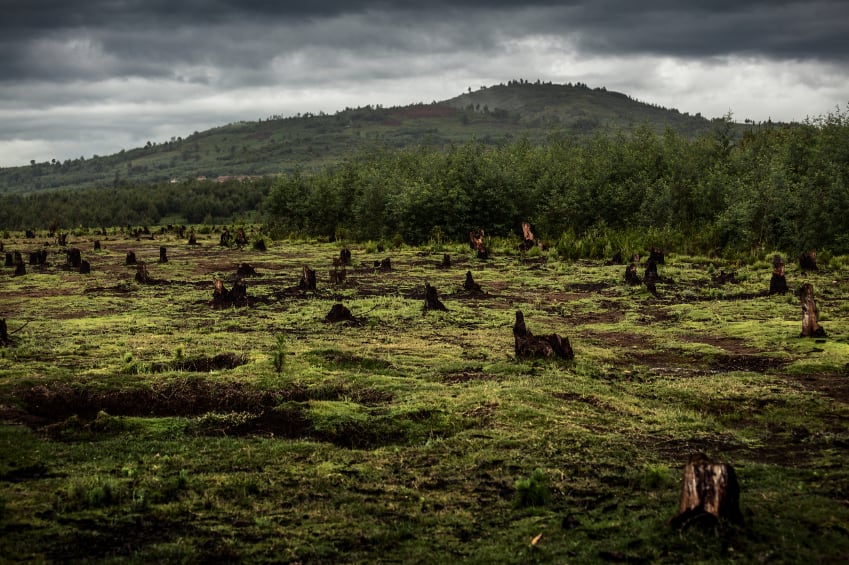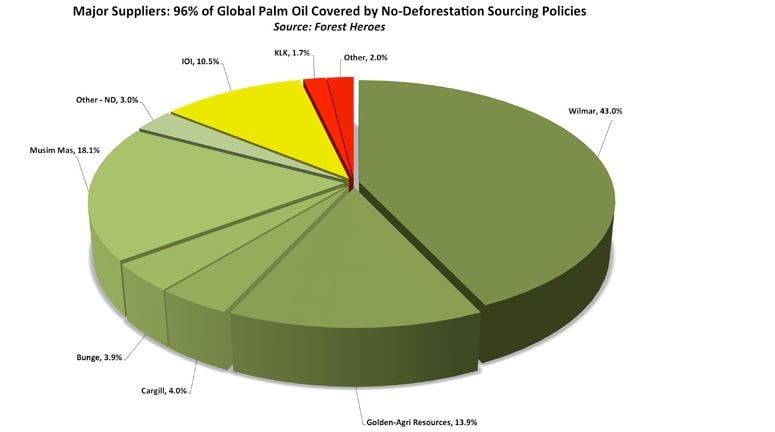Increased public awareness of the environmental problems associated with palm is growing thanks in part to high profile campaigns by NGOs. This has prompted manufacturers to source sustainable palm oil and make ‘deforestation-free’ claims on their products
But a recently published study by researchers from Imperial College London suggests that the unilateral ‘no-deforestation’ commitments made by manufacturers is unsuited to the complexity of the palm oil supply chain and is, therefore, likely to fail.
In order to understand the complexities of the palm industry, the researchers questioned a range of actors in the supply chain serving European markets: growers, large integrated supply chain companies (LISCC), processors/refiners, ingredient suppliers, consumer goods manufacturers and retailers, although they note that some companies – such as Wilmar International –occupy several roles simultaneously.
Growers felt that ‘no deforestation’ was a marketing term that made little sense in practice, while further downstream, manufacturers had different understandings of what ‘no deforestation’ means and how this could be achieved in practice. Some felt that eliminating deforestation might be unachievable while others were unequivocal: ‘no deforestation means no deforestation’.
The interviews also revealed conflicts within companies. One manufacturer said its retail customers often failed to stick to their commitments because the commercial teams ignored the sustainable sourcing policies.
Define deforestation

According to some estimations, around 96% of global palm oil production is covered by some form of no-deforestation commitment.
These commitments, however, hide a lack of consensus on some important, fundamentals: what is a forest and what is deforestation?
Given the different forest types, users, applications and cultural understandings, these seemingly simple questions can actually be contentious, write the

researchers.
Under the principles and criteria (P&C) of the Roundtable on Sustainable Palm Oil (RSPO), primary forests and other areas identified as being of High Conservation Value are protected and cannot be cleared.
However, the authors note that most of the remaining forest in Indonesia and Malaysia – countries that together produce around 85% of the world’s palm oil – is classed as secondary, selectively-logged or degraded.
Although these forests may still have important biodiversity value, current RSPO rules allow them to be cleared for palm plantations. This means that a jar of peanut butter made using RSPO-certified oil does not necessarily mean deforestation-free.
The researchers are somewhat optimistic, however. The fact that a consensus on a deforestation definition was recently reached through the High Carbon Stock Approach may be one positive step.
One grower said: “We’ve got a demand; a demand for sustainably-produced oil. Concept requests for assurances – no deforestation – but a market that’s not prepared to pay for it. So, yeah. That would be the single big issue. Yes, we can do these things, but surely you’re going to pay for it.”
Another is that RSPO, which last updated its P&C in 2013, is currently reviewing them and may widen its definition of deforestation.
“The supply chain certification mechanisms offered by the RSPO have the potential to help address some of the shortcomings, if a unified and practicable no-deforestation concept can be incorporated into the standard,” they write.
‘The current model is likely to fail’
While the ‘naming and shaming’ tactics of the past have been effective in getting companies to make deforestation-free commitments, the context surrounding commitment implementation is problematic, says co-author Dr Andrew Knight, from the Department of Life Sciences at Imperial College London.
“Shaming may not continue to achieve positive outcomes in terms of reduced deforestation if the complex issues impeding implementation are not worked out.”
“The existing model for managing palm oil production in which companies adopt unilateral no-deforestation commitments is unsuited to the complexity of the palm oil supply chain and is, therefore, likely to fail,” they conclude.
An LISCC said: “Buying from other people’s mills, it is difficult to impose our standards to them, because they also have freedom to choose whether they would like to sell to us or to sell to our competitors… Third-party mills are not an entity that we can give instruction to, that we can tell them what to do. We need to talk with them as business partners.”
Instead, the researchers conclude that multi-stakeholder platforms such as the RSPO and Consumer Goods Forum (CGF) are “likely to prove important” in bringing about the collaboration necessary for change to happen.
“The palm oil supply chain is a complex social system, not simply a commodity-handling process, which may preclude the implementation of no-deforestation commitments in many cases,” they write.
“Without effective collaboration between companies – both horizontally within supply chain tiers (e.g. collective action by CGMs to influence suppliers) and vertically between tiers (e.g. integrated value-chain initiatives) – the elimination of deforestation cannot be guaranteed,” they write.
In addition to this and an agreed definition of deforestation, however, other elements are necessary: improved government regulation and increased demand for sustainable palm oil in China and India.
Knight concluded: “A more collaborative and supportive approach to understanding supply chains and the people and companies that comprise them is required. Based on this common understanding, more effective strategies can be developed, founded upon thoughtfully constructed certification and stronger government regulation, which will be more likely to ensure the rate of deforestation of these vulnerable and important ecosystems slows.”
Source: Global Environmental Change
“Palm oil supply chain complexity impedes implementation of corporate no-deforestation commitments”
Published online ahead of print, 23 May 2018, doi.org/10.1016/j.gloenvcha.2018.04.012
Authors: Joss Lyons-White and Andrew T. Knight
